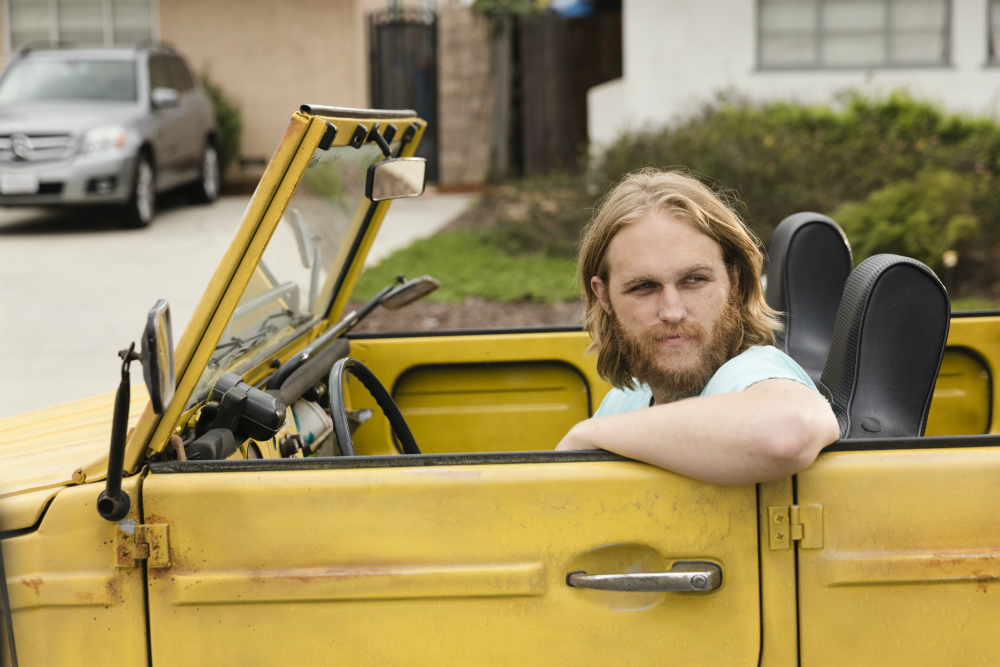‘Lodge 49’ Bosses on Making a ‘Modern-Day Fable’
By Debra Birnbaum
LOS ANGELES (Variety.com) – Some series can be summed with a simple logline — and then there’s “Lodge 49,” AMC’s new “modern-day fable” set to debut on August 6th.
Executive producers Peter Ocko and Jim Gavin (who created the show) admit their series defies any concise elevator pitch. But therein lies the charm, they say. “I had this image in my head for a long time of a young man knocking on a door, and an old man opening it. And that was it,” says Gavin. “The meaning of that moment is the whole show.”
The drama, which premiered last month at SeriesFest in Denver, traces the unlikely friendship between Dud (Wyatt Russell), a down-and-out ex-surfer, and Ernie (Brent Jennings), a middle-aged plumbing salesman who meet when Dud shows up at Ernie’s lodge in Long Beach, CA.
“Our characters are probably the least aspirational characters on television,” says Ocko, who also serves as showrunner. “There’s a shared thread for all of these characters, finding something in the lodge that would make them more whole than they would be without it.”
Gavin reveals this story is a personal one for him — having watched his own family lose everything in a foreclosure, even squatting in their former home, hiding from realtors, as Dud does. (Unlike Dud, though, he’s never been bitten by a snake — though he admits to being “terrified” by them.)
A novelist, he’d turned his life experiences into a screenplay, which eventually caught the eye of Paul Giamatti and Dan Carey, who stepped in as producers to help shepherd the project. It made the rounds, but “everyone in town passed almost immediately,” recalls Ocko. “AMC was the only one.” The “arranged marriage” of the two men was AMC’s idea, but Gavin — who had no prior TV experience — calls teaming up with the more experienced Ocko “love at first sight.”
In a sign of AMC’s show of support for the series, “” landed the plum August 6th timeslot, following the much-anticipated return of season 4 of “Better Call Saul.”
The producers acknowledge the idiosyncratic, comedic tone is a shift for the cabler, which is better known for its dramas. “We wanted to make something that felt more like a joyride,” says Ocko.
There’s a touch of magic, too, in the “kingdom of Long Beach,” as they describe it, likening the unlikely friendship that springs up between Dud and Ernie as a “story of the knight and the squire going on a quest.”
Russell was on “a list of one” when it came to casting the key role of Dud. When the producers met with him (he’d read the script when it was making the rounds), they say, “It was like having lunch with Dud, but a Dud who could step outside of himself and was incredibly self-aware. There’s an optimism in him as a human that flows through Dud,” says Ocko.
And they also intended that the squire — as in Gavin’s real-life inspiration for the story — be a person of color. “It’s meaningful to the history of Long Beach, meaningful to the history of the lodge,” says Gavin. “Every character does come out of my life in some way.” And Jennings perfectly embodied the character, “an underdog, a guy who’s never quite gotten his due,” says Ocko. And given that they had all 10 scripts written, they were able to convince Sonya Cassidy to sign on as Dud’s sister Liz. Even though she only has a few scenes in the pilot, her story plays out stronger throughout the season.
The 10-episode series shot in Atlanta, thanks to tax incentives, but was able to afford to shoot about 10 percent on location in Long Beach. Key to the visual style, says Gavin, was trying to “capture some feeling of low-slung, hazy southern California.”
Also key was a more languid storytelling style. “We wanted to let scenes play where you’re watching all of the characters, rather than in your face telling you where the laugh is,” said Ocko. “We want to tell these stories that are very real without people skipping to the plot points.”
Quips Gavin: “Luckily, there are no plot points.”
Though things are often left ambiguous, Ocko adds that everything that happens onscreen is intentional. “By the time you get a couple of episodes in, you realize there’s nothing in here by accident,” he says. “Things that are tossed off absolutely have meaning and are important moving forward. As much as it’s a show without a lot of plot, it actually, there’s a lot of stuff going on. We’re hoping the audience picks up on that.”
The show’s creators says they hope they can “dust off” fraternal orders and perhaps even recruit new members. “That would be a good thing,” says Gavin. “To have a place where people can go and meet face-to-face.”
Adds Ocko: “Maybe that’s the truth: it’s a cheap beer and a place to see your friends. And why wouldn’t you want to do that?”

